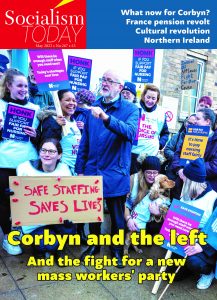
After the Labour Party national executive committee voted 22-12 to ban Jeremy Corbyn from standing as a Labour candidate in the next general election, HANNAH SELL looks at the fight for a new mass workers’ party and contrasts the approach of the Socialist Party with others on the left.
The rise and now the dramatic fall of Jeremy Corbyn within the Labour Party opens up a qualitatively new terrain. Discussions on how the workers’ movement can have a political voice are set to intensify.
This is not a new debate. It has ebbed and flowed, in different forms, ever since Tony Blair began the process of transforming the Labour Party into ‘New Labour’ over 30 years ago. In 2004 the Fire Brigades Union disaffiliated from Labour, following its national strike against a pay offer overseen by Tony Blair’s New Labour government. Also in 2004 the Rail Maritime and Transport (RMT) workers’ union, whose predecessor union was central to Labour’s foundation, was summarily expelled by the Labour Party executive for the ‘crime’ of some of its branches backing non-Labour socialist candidates.
Nonetheless, despite huge discontent, the majority of trade unions maintained their Labour affiliation throughout the Blair years, and no new mass trade-union based party came into existence then or afterwards. This is used by some as an argument that the trade unions’ relationship with Labour is immutable and unchangeable. But this is negated by reality. Substantial and rapid shifts have taken place over recent decades, and much greater changes are likely in the coming years. The ground is being prepared for a new political upsurge, which the lessons of the last period could potentially lift onto a higher level than Corbynism.
Read more